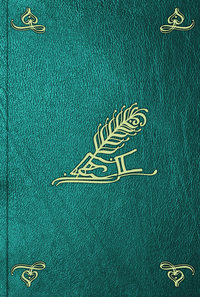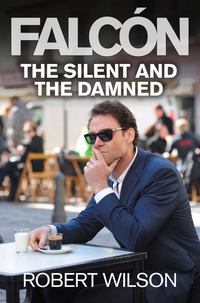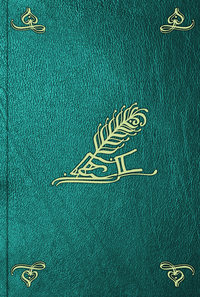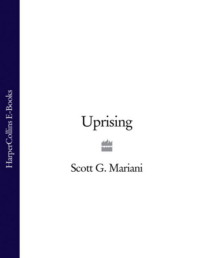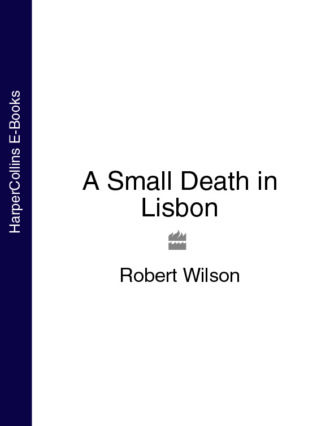
Полная версия
A Small Death in Lisbon
‘Sachsengruss,’ said the guard with the club.
Felsen put his hands on his head and began doing knee-bends. The Saxon Greeting. They kept him at it for an hour. Then they told him to stand to attention for an hour, until his body was shaking with cold and his ears full of the swish from the cable, the slicing of the spade, the tamping of the wooden club. The guards trod a circle around him.
They removed his handcuffs. The spade flew through the air at him. He caught it in fingers which he expected to shatter like porcelain.
‘Dig a path to the building.’
They walked behind him over the vast area as he dug hundreds of metres of paths. Tears streamed down his face, the snot ran in freezing rivulets from his nose, the steam poured off him thick as bull’s breath. It began to snow. They told him to reclear the paths he’d already made.
They worked him for six hours until it was completely dark, no light coming from the blacked-out buildings. They faced him out into the darkness and gave him another hour’s Sachsengruss while they told him how he was going to have to clear it all again tomorrow. In the last ten minutes he dropped to the floor twice and they kicked him back up on to his feet. He was glad to be kicked. He knew something from the kicking. He knew they weren’t going to beat him to death with the club, cable and spade.
They stood him to attention after that until a thin reed of music came floating through the pitch black. They told him to march into the building. He fell over. They dragged him backwards inside. His feet trailed damp lines over the polished floors.
The warmth of the building seemed to unfreeze his mind and tears poured out of his head, water leaked out of his nose and ears. The music grew louder. He knew it. Mozart. It had to be. All those notes. Voices and laughter came over the music. A familiar smell. The guards’ boots rolled over the polished floors. Felsen’s feet came back to a life of pain but he was grinning. He was grinning because he knew now what he’d suspected before out in the snow – he wasn’t in Sachsenhausen.
They arrived in a room with chairs and carpets, newspapers and ashtrays – unimaginable civilization after Prinz Albrechtstrasse. They stopped. The guards got him standing. One of them knocked and they took him backwards into the room. A girl giggled. The talking subsided, only the music remained.
‘Does the prisoner like this music?’ asked a voice.
Felsen swallowed hard. His legs trembled. His humiliation stiffened his neck.
‘I don’t know whether I should like it, sir.’
‘You have no opinion?’
‘No, sir.’
‘This is Mozart. Don Giovanni. This has been banned by the Party. Do you know why?’
‘No, sir.’
‘The libretto was written by a Jew.’
The music was cut.
‘Now what did you think of the music?’
‘I didn’t like it, sir.’
‘Why are you here?’
‘I’ve been sent back to school, sir.’
Felsen’s feet throbbed in his ruined shoes, the blood thumping through them.
‘Why are you here?’ asked a different voice.
He thought for a long minute.
‘Because I’m lucky at cards, sir,’ he said, which screwed the tension down in the room so that the girl tittered. ‘Sorry sir, because I cheat at cards, sir.’
‘Prisoner, turn around and stand at ease.’
He didn’t see who was sitting at the table at first. His watering eyes took in the gross quantities of food before anything. Then he saw Wolff, Hanke, Fischer and Lehrer, two other men he didn’t know and a young woman who was smoking through lipstick already smudged.
Lehrer was smiling. The Brigadeführers were all amused. Fischer broke first and roared and drummed the floor with his boots. They all laughed, banging the table, even the girl, who didn’t know why she was laughing.
‘Is the prisoner permitted to laugh?’ asked Hanke.
They roared again.
‘Prisoner Felsen. Laugh!’ shouted Fischer.
Feslen smiled and started to blink, conjuring mirth from relief. His shoulders began to shake, his stomach pumped and he laughed, he laughed himself helpless, he laughed himself to a retching standstill. He laughed the SS officers silent.
‘The prisoner will stop laughing now,’ said Lehrer.
Felsen’s mouth clamped shut. He returned to ‘at ease’.
‘There are some clothes for you in there. Change.’
He went into the kitchens, stripped and got into a dark suit which hung off him. He rejoined the table.
‘Eat,’ said Lehrer.
He laid waste to the table in his immediate vicinity more thoroughly than a retreating army. The officers talked amongst themselves except Lehrer. ‘Don’t think I’m a bad loser,’ he said.
‘I don’t think that, sir.’
‘What do you think?’
‘I think you are what your name implies . . . a teacher, sir.’
‘And what have you learned?’
‘Obedience, sir.’
‘We’re giving you this job you don’t want for a number of reasons. You can organize things. You are ruthless and aggressive. But you must not be insubordinate, Felsen. In your business you might lose an hour’s production because somebody didn’t follow your orders. In the business of war it could be a thousand lives or more. There’s no place for the maverick. Control is the key. And I am in control,’ he said, swilling the brandy in his glass. ‘So why don’t you want this job?’
‘I don’t want to leave Berlin, sir. I have a factory to run.’
‘At least it’s not a girl.’
‘I’ve produced quality goods and I’ve shown my appreciation.’
‘Don’t start on a different question. What’s in Berlin for a Swabian like you apart from your factory? We’re not talking about Paris or Rome. It’s not a city you can fall in love with. Not like Nuremberg, my city. And Berliners? . . . My God, they think the world owes them a living.’
‘Maybe I like their sense of humour.’
‘Yes, well, you’ve always been a bit dry down in Swabia.’
‘I don’t follow you, sir,’ said Felsen, touchy.
‘Trampled to death by a pig. What was that?’
Felsen didn’t respond.
‘Do you think I don’t know about your father?’ said Lehrer.
‘Yes, well, there you have two examples of Swabian humour.’
‘It gave me a problem, Hanke thought you were psychologically unsuitable.’
‘I should have tried harder with him.’
Lehrer leaned across the table, his face flushed with wine, his breath sour and cigar-streaked.
‘This job is a big opportunity for you . . . a big opportunity . . . You will thank me for it. I know you will thank me.’
‘Then why don’t you tell me about it, sir?’
‘Not yet. Tomorrow. You’ll come to Lichterfelde. I’ll have you sworn in first.’
‘Into the SS?’
‘Of course,’ said Lehrer, until he saw Felsen’s frozen face. ‘Don’t worry, you’re going west, not east.’
They drove slowly north through the fresh snow back to Berlin. That familiar smell had been the Lichterfelde barracks. On the few occasions a car passed in the other direction Felsen could see the shadows of the officers in the car in front, passing the girl between them. Lehrer didn’t speak. It stopped snowing. They cruised into Berlin and the first car peeled off to the Tiergarten and Moabit. Lehrer ordered the driver to do a small circuit of the city. Felsen stared out into the dark, the black parks, the flak towers, the lightless houses, the silent Anhalter station.
‘It’s the nature of war,’ said Lehrer, ‘that things happen. More things happen than could possibly happen in peacetime. In that respect it’s the most exciting time of a man’s life. One moment you’re running a factory, making more money than you could ever dream of as a farmer in Swabia. You dance with girls in the Golden Horseshoe, watch the shows in the Frasquita, walk the Kufu with all the other monied bastards. And the next moment . . .’
‘I’m in Prinz Albrechtstrasse.’
‘A new and radical regime must protect itself. Strength through fear.’
‘And the next moment . . . go on.’
‘Think international. Germany is not just Germany any more. Germany is the whole of Europe. A world power. Political and economic. Don’t be small-minded.’
‘It’s my peasant mentality. It’s how I get things done for the money.’
‘That’s good, but see the big picture too. The Reichsführer Himmler wants the SS to be an economic power in its own right within the new Germanic Reich. Think about that.’
The car finally turned into Nürnbergerstrasse and pulled up outside Felsen’s apartment. He got out and went up the two flights of stairs and found his front door repaired. He let himself in and lit one of his own cigarettes. He looked from behind the blackout and found the car gone. He put on a coat and hat and went out into the night.
It was a short walk to Kurfürstenstrasse. He walked in the street where it was easier. There was nobody out. The temperature had dropped sharply.
Felsen went down the small lane at the side of Eva’s apartment building and in through the gate. The mounds of earth and rubble taken out of the cellar were covered in thick snow. The door was locked. He hammered on it and stepped back and up on to one of the mounds to see if there were any cracks of light around the windows. He roared her name. After a few moments someone opened a window and told him to shut his drunken talk.
He went back home, soaked in a bath and got into bed. It was 2.30 a.m. He’d call her in the morning, he thought, as he drifted into his first hour’s sleep. He came awake four times, each time with a rush and a crack in his head as if he’d been hit with a brick. There was the smell of shit in his nostrils, and the last frames of his dream stayed with him; the white of the widening parade ground lengthening out for ever. He had to put the light on after that.
Конец ознакомительного фрагмента.
Текст предоставлен ООО «ЛитРес».
Прочитайте эту книгу целиком, купив полную легальную версию на ЛитРес.
Безопасно оплатить книгу можно банковской картой Visa, MasterCard, Maestro, со счета мобильного телефона, с платежного терминала, в салоне МТС или Связной, через PayPal, WebMoney, Яндекс.Деньги, QIWI Кошелек, бонусными картами или другим удобным Вам способом.


